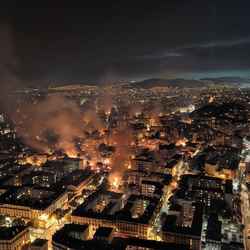Jaihabar Vortex
| Jaihabar Vortex | ||||||||
|---|---|---|---|---|---|---|---|---|
 The Agra Square incident |
||||||||
|
||||||||
| Belligerents | ||||||||
| State Government: | Imperial Government: | Opposition:: |
||||||
| Commanders and leaders | ||||||||
 Süleyman Çelebi Sultan of Jaihabar |  Zahra al-Osman Ataliq (regent) untill 1738 AN  Xunpadshahan Shahanshah of Çakaristan | High King of the Caverns | ||||||
| Units involved | ||||||||
The Jaihabar Vortex is an internal conflict in Çakaristan, mainly in Jaihabar. This sultanate located on Corum lapsed into civil war.
It began with non-violent protests against announced tax increases by the sultan, Süleyman Çelebi. Through a combination of insistence on the announced plans and rebels seeking to take advantage of the situation, the protests turned into an armed conflict.
There was interference from rebels, who identified themselves as the Braxian League and operated from the complex system of caves.
Background
- See also: Xunpadshahannama: Rajas of the Sandstorm
In 1737 AN, Dervish Çelebi, sultan of Jaihabar, died; he was succeeded by his son, Süleyman Çelebi. The young sultan faced declining investment from Agra. In turn, the Ataliq (regent), Zahra al-Osman, had reduced investments to Jaihabar as a result of the international Recession of 1737. This became one of the reasons that the Shahanshah, Xunpadshahan, fired her. In addition, the new domination over the area did not integrate with the original population. Although there were few remnants, there appeared to be a second society functioning underground that was out to disentangle itself from this new domination.
Course
Initial protests
After the death of Dervish Çelebi and the enthronement by Süleyman Çelebi, it began to become clear that the new sultan was going to implement tax increases. The Majlis al-Sultina had no option but to agree, as the necessary funding from Agra was dwindling. The debts the sultanate was allowed to take on was legally limited; that limit was already almost reached.
In several cities, including Al-Pallis, Mathura, Mangas and Shakuras, protests arose against the announced tax increases. These proceeded peacefully and the protesters consisted mostly of the working class. After the celebrations around Çakaristan's 50th anniversary, protests intensified and disruptions arose. Students erected barricades around campuses, threw firebombs at tax offices and occupied university buildings.
Flight of the squeakers
Already during the festivities to mark the enthronement of Süleyman Çelebi, Astīr bint Alsalam fled with her other children, Safiye, Mehmed and Selim. Astir knew her son and suspected a dark time. The Shahanshah had sent the unofficially named unit ‘Shah's Amazons’ to relieve the sultana widow and her children. Only halfway through the Sea of Storms did an arrival elsewhere in Çakaristan prove not safe enough. It was therefore diverted to Kurum Ash-Sharqia, where Astir and her children stayed in hiding and in exile.
The Agra Square incident
After months of protests across the sultanate, a form of cooperation emerged between the protest groups to organise a large demonstration in Mathura, the capital of Jaihabar. The security forces tried to prevent this from happening and intervened more and more forcefully. On the announcement of the big demonstration, checkpoints were set up at railway stations and the main roads leading to the capital.
Despite this, a large crowd was still able to reach the capital and the big demonstration began a day earlier than supposedly planned. The sultan had pressured the media not to report on the demonstration, but coverage of it spread via Tweeter. At this, the sultan wanted the medium blocked; this turned out to be beyond his control. The New Alexandrian company is nationally registered and falls under the national supervisory authority.
At 10:03 am on 11.XI.1737 AN, shots were fired from one of the buildings on the square. This caused great chaos. It is unknown how many protesters fell victim to the firing and the chaos that followed. The protesters blamed the forces of order and held the sultan responsible. The sultan denied involvement, but the harm had already been done. Orderlies had to withdraw from the city centre because of the angry crowd.
The day this took place was kept as the official starting point for what came to be called the Jaihabar Vortex.
Zahra's intervention
A day later, Agra decided to provide military support to the sultan. The First Expeditionary Corps was sent to support the Jaihabar Military District force. The deployment was coordinated with Mathura. As a result, the military was deployed to reinforce the forces of order, thereby increasing its striking power. However, this caused soldiers to be deployed against their own civilians. This was poorly received by both the people of Jaihabar and elsewhere in the Empire.
For days, the government in Agra was unwilling to talk to the press about this. Only when the congress insisted on accountability did an explanation come. The Vizier al-Harb (defence minister) told the congress committee that unknown rebels had emerged and that the deployment of the First Expeditionary Corps was aimed at them. There was dissatisfaction among the congressmen, even a vote of no confidence was taken. No majority turned out for this.
Rebellion from below
As early as the incorporation of Jaihabar, there was awareness of the unknown underground world. This was often dismissed as mysterious and legendary. Yet it turned out that rebels turned up in various places, particularly around Lake Norton. Those rebels took advantage of the resulting unrest and started an armed conflict with the occupiers. According to these rebels, Çakaristan's entire presence on Corum was an occupation, occupation of their land. The rebels identified as the Braxian League.
In a video message, the High King of the Caverns stated that he is not fighting Çakaristan, as the Empire was once allied with the Haifo-Pallisican Imperial Trade Union through the Collective Security Association and its predecessor. But against the mismanagement of the Sultan of Jaihabar. Sepahbod (Lieutenant General) Arjuna Shree, commander of the Jaihabar Military District and former secretary-general of the Collective Security Association, said, "Any resistance to the Shahanshah's authority is hostile and must be fought."
The first clashes between the Braxian League and the Çakari Armed Forces were just south of Mangas. However, before reinforcements were on the ground, the Braxians had already disappeared from the battlefield. Although the soldiers saw this as victory, the Sepahbod reckoned with a reconnaissance-in-force.
Split of parties
After the resignation of Zahra al-Osman as ataliq, Xunpadshahan took charge of the operations by the Çakari Armed Forces on Corum. Immediately, the armed forces were relieved to act as forces of order so that military personnel were not used against peaceful civilians. Focus on control of strategic points. Jazirat Al-Borani was reinforced and base for operations. The Shahanshah himself travelled to the island. As a result, the island was referred to as Fort Xunpadshahan. The Shahanshah called on the sultan to similarly come to the island. Only Süleyman Çelebi refused and remained in Mathura.
Even remotely, the Shahanshah and the Sultan could not achieve cooperation. Therefore, the Shahanshah took a drastic decision, by talking to the High King of the Caverns. This led to an agreement, concluded at Lake Norton.
Çexit
The agreement had decided that the Çakari flag would be lowered over Corum by the end of 1739 AN at the latest. Only Jazirat Al-Borani was retained and would be handed over to the Imperial Federation. Evacuation began of all civilians who wanted it and all military equipment under the Jaihabar Military District. This was accompanied by the First Expeditionary Corps.
Refugees
Immediately after the Agra Square incident, people started leaving the sultanate. Both domestic and foreign flights were used by people to leave the sultanate. Later, the Jazirat Al-Borani was considered a safe haven and the destination for many refugees.
Reactions
Domestic
Media outside Jaihabar tried to report from what was happening. Especially since the sultan had pressured media in Jaihabar not to report on the demonstrations, many national media lost their sources of information in the sultanate. As a result, they focused on what was shared through Tweeter. Due diligence for independent news reporting was thus undermined.
Nevertheless, demonstrations also arose in Apollonian Çakaristan. In Agra, there were protests that started at the Raashtr ka Mahal (Palace of the Nation, the seat of the Çakari Congress) after which the crowd marched to the Jaihabar Bhavan (Jaihabar residence, the princely embassy). Police escorted the demonstrating crowd, but the Jaihabar Bhavan was barricaded. Despite dismay at this, things remained calm and the demonstration went on peacefully. There were demonstrations in other cities too, such as Maulikpur and Manbai, with no significant events taking place.